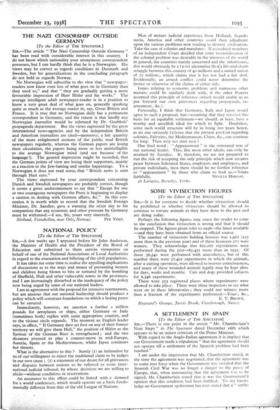NATIONAL POLICY
[To the Editor of TIM SPECTATOR] SIR,—A few weeks ago I appeared before Sir John Anderson, the Minister of Health and the President of the Board of Education and submitted to them certain viewpoints on behalf of one of the National Associations of Local Authorities in regard to the evacuation and billeting of the civil populations.
It has taken me some time to realise the appalling implications of discussions as to the ways and means of preventing women and children being blown to bits or tortured by the bombing of Sheffield, Hull and other vulnerable towns in the provinces, and I am increasingly disturbed at the inadequacy of the policy now being urged by some of our national leaders.
I am in agreement with the proposal for intensive rearmament, but am anxious that our national leadership should produce a policy which will construct foundations on which a lasting peace can be ensured.
Immediately, however, we sanction a further x million pounds for aeroplanes or ships, either Germany or Italy (sometimes both) replies with some appropriate counter, and so the vicious circle expands. The moment an English leader says, in effect, " If Germany dare set foot on any of their former territory we will give them Hell," the position of Hitler as the Saviour of the German Race is strengthened ; and the two dictators proceed to plan a counter-move in mid-Europe, Austria, Spain or the Mediterranean, whilst Japan continues her thrusts.
What is the alternative to this ? Surely (t) an intimation by us of our willingness to reject the traditional claim to be judges in our own cause ; (2) a statement of our desire for all grievances and disputes between nations to be referred to some inter- national judicial tribunal, by whose decisions we are willing to abide—without conditions or reservations.
An assurance to this effect could be linked with a demand for a world conference, which would operate on a basis funda- mentally different from that of the old League of Nations. Men of mature judicial experience from Holland, Scandi- navia, America and other countries could then adjudicate upon the various problems now tending to destroy civilisation. Take the case of colonies and mandates : If accredited members of an independent Court decided that some reconsideration of the colonial problem was desirable in the interests of the world in general, the countries mainly concerned and the inhabitants, this would obviously be a Letter alternative than a life-and-death struggle between this country of 4o millions and a united nation of 7o millions, which claims that it has not had a fair deal. Incidentally, an armed conflict could never determine the justice or otherwise of the claims of either side.
Issues relating to economic problems and numerous other matters could be similarly dealt with, if the other Powers accepted this principle of reference (which would enable us to put forward our own grievances regarding propaganda, re- armament, &c.).
Personally, I think that Germany, Italy and Japan would agree to such a proposal, but—assuming that they rejected this basis for an equitable settlement—we should, at least, have a worthy and unselfish ideal for which to fight. Doubtless, some such world structure will be in being too years hence, as no one seriously relieves that the present position regarding colonies, Palestine, the Mediterranean, China, &c., can continue for long. Then why not start now ?
One final word : " Appeasement " is the reiterated text of our national leader. This, like most other ideals, can only be attained by Sacrifice. If, therefore, we are not prepared to run the risk of accepting the only principle which now ensures peace between federated States, employers and employees, and private individuals, then there should be no further reference to " appeasement " by those who claim to lead us.—Yours faithfully, NEVILLE HOBSON. 26 Lairgate, Beverley, Yorks.


































 Previous page
Previous page